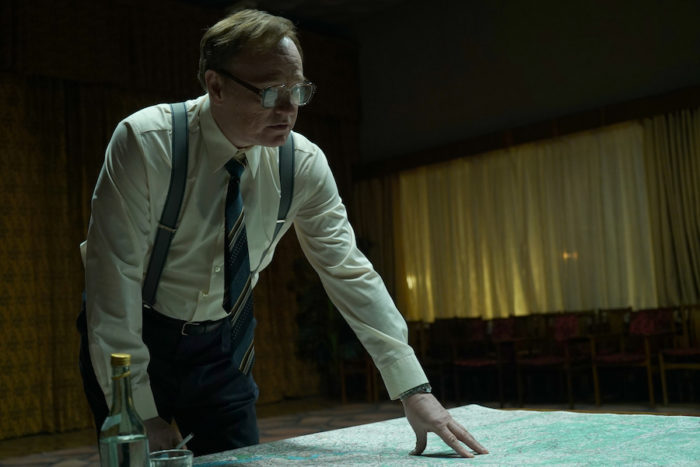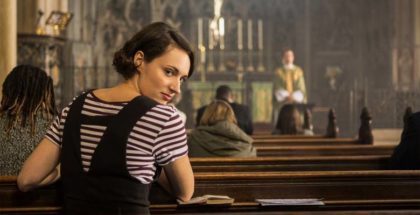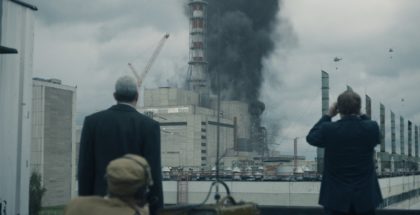UK TV review: Chernobyl
Review Overview
Chaos
10Human collateral
10Pacing
10David Farnor | On 08, Jun 2019
There are TV shows that leave you gripping your arm rests and TV shows that leave you quivering with fear. Chernobyl, Sky and HBO’s drama about the nuclear power plant disaster, is a TV show that leaves your hands so clammy with dread that you can’t grip anything.
The April 1986 incident is one of the most well known catastrophes in history, but it’s also one of the least discussed; most people don’t know the details of what happened. This six-part thriller clinically hones in on one alarming, important fact: nobody there knew what happened either.
Written by Craig Mazin (whose CV also includes The Hangover Part II), the show thrusts us into a chaotic nightmare where the ground is shifting beneath everyone’s feet, in all senses of the word; while scientists try to diagnose what went wrong and how to fix it, politicians make the contaminated water even muddier than it already is, coming up with false truths, alternative facts and half lies to insist everything is ok.
It’s a theme resonates all too strongly with modern society, particularly when it comes to climate change misinformation, and it’s one that Chernobyl returns to time and time again, with increasing urgency. Our window onto events is Valery Legasov (Jared Harris), a physicist who is approached to be an expert on the panel to address the fallout – an expert who must only answer questions when spoken to and certainly never ask any of his own.
He’s joined by an excellent Paul Ritter, who plays Anatoly, the man in charge within the power plant, who refuses – despite very obvious evidence – that nothing is wrong. As men inside the building, and firefighters outside, are ordered to fix the problem, every step that sends unwitting humans into radioactive danger gets more painful to watch. Between the gainsaying denials and the political meeting that leaves people cheering Mikhail Gorbachev, it’s like an episode of The Thick of It, if The Thick of It were a horror movie.
After the opening episode that sees the disaster arrive almost seemingly from nowhere, the ensuing chapters pick through the aftermath with a horrific immediacy and a blunt depiction of the very real personal costs at stake. We see the nasty job of having to limit the spread of the damage by hunting down contaminated animals in the neighbourhood – a task given to young volunteer Pavel (a heartbreaking Barry Keoghan), who is overseen by callous soldier Bacho (the always-excellent Fares Fares). In one impossibly nailbiting sequence, we watch as humans are sent to the roof to clear graphite off the building (in a cruel display of irony, a robot can’t handle under the radiation levels), a cycle of 90-second charges that’s accompanied by the chilling sound of a Geiger counter. In the most moving scenes, we follow a superb Jessie Buckley as Lyudmilla Ignatenko, wife of plant worker Vasily Ignatenko, who notices the spike in radiation levels and heads to be with her husband – a journey of compassion and concern that cannot end well.
That inevitability, the unassailable facts of the matter, loom like the almost tangible toxic cloud over everything – a haunting demonstration of the unstoppable power of truth, even in the face of lies and truth. When Valery and Council of Ministers deputy chairman Boris Shcherbina (Stellan Skarsgard) ask a bunch of coal miners from Tula to dig a tunnel under the plant to prevent fuel melting into the groundwater, they both know that it’s a mission that will kill them all. What’s nightmarish is that the miners know it too, yet still strip down naked to be able to dig the tunnels and cope with the heat.
Throughout, Harris and Skarsgård develop an almost buddy-cop chemistry, as they wade through the steps of problem-solving (put out the fire, drain the basement, protect the water supply…) with contrasting views of what’s true and what’s officially recognised as true. That tension between them blends with their mutual respect, and their shared acknowledgement that both will be irreparably ill as a result of their presence in Chernobyl. Putting the pressure on both is Ulana Khomyuk (a stubbornly committed Emily Watson), a nuclear physicist from Minsk who suggests the cause of the meltdown may have been the power plant itself, rather than mistakes by the people operating it.
The events are, of course, presented with stunning visuals, more ethereal and haunting than beautiful; director Johan Renck, who helmed Sky Atlantic’s The Last Panthers, as well as David Bowie’s Blackstar, composes each frame with grim details and sickening bursts of colour. “Do we have iodine tablets?” asks one nurse in the nearby hospital. “Why would we?” comes the reply, as the fire burns over the horizon in the background.
It’s telling that, rather than climax with yet more nerve-jangling VFX and containment efforts, Chernobyl’s final chapter comprises of a low-key court trial – one that sees Legasov give testimony that explains how everything happened from beginning to end. It’s a remarkable piece of writing, one that effectively turns the drama into a science lesson, and explains nuclear fission in a way that’s not only accessible, but also absolutely riveting. Harris delivers one of the best turns of his career in this hour alone, as he breaks down the physics, while also navigating the potential breakdown of his own inner morals. Because the question, at the end of it all, isn’t how Chernobyl happened, or what happened next, but whether anyone would be willing to admit the truth about it. The only thing scarier than seeing these heroes trying to stop this manmade disaster from spiralling out of control is seeing them go unrecognised by history that would rather cover them up. If you can stomach six hours, this is one of the most gripping, bleak and essential TV shows of the year.
Chernobyl is available on Sky Box Sets. Don’t have Sky? You can watch it online legally in the UK with NOW, as part of a £7.99 monthly subscription – with a 7-day free trial for new customers.





















